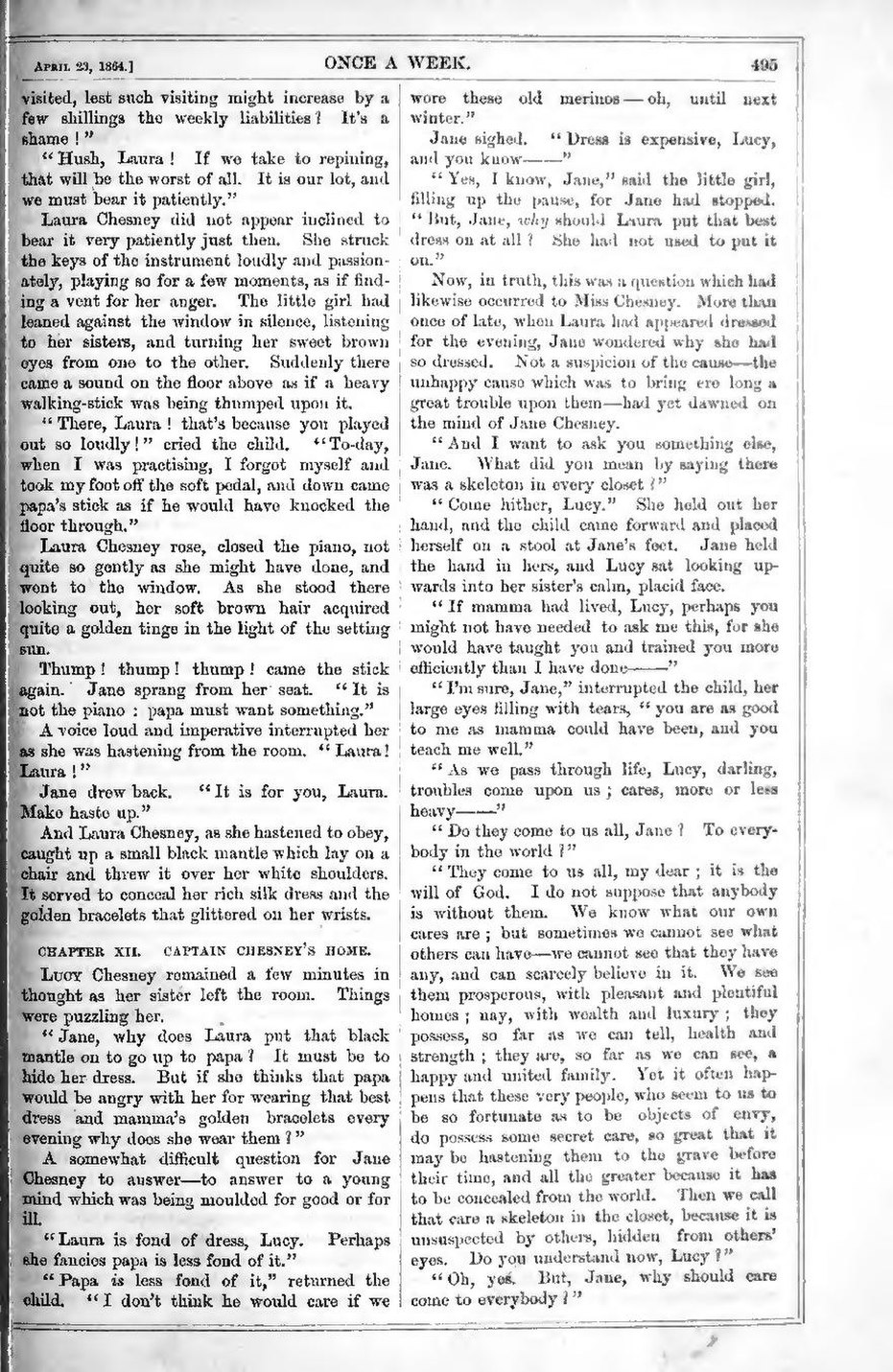visited, lest such visiting might increase by a few shillings the weekly liabilities? It’s a shame!”
“Hush, Laura! If we take to repining, that will be the worst of all. It is our lot, and we must bear it patiently.”
Laura Chesney did not appear inclined to bear it very patiently just then. She struck the keys of the instrument loudly and. passionately, playing so for a few moments, as if finding a vent for her anger. The little girl had leaned against the window in silence, listening to her sisters, and turning her sweet brown eyes from one to the other. Suddenly there came a sound on the floor above as if a heavy walking-stick was being thumped upon it.
“There, Laura! that’s because you played out so loudly!” cried the child. “To-day, when I was practising, I forgot myself and took my foot off the soft pedal, and down came papa’s stick as if he would have knocked the floor through.”
Laura Chesney rose, closed the piano, not quite so gently as she might have done, and wont to the window. As she stood there looking out, her soft brown hair acquired quite a golden tinge in the light of the setting sun.
Thump! thump! thump! came the stick again. Jane sprang from her seat. “1t is not the piano: papa must want something,”
A voice loud and imperative interrupted her as she was hastening from the room, “Laura! Laura!”
Jane drew back. “It is for you, Laura. Make haste up.”
And Laura Chesney, as she hastened to obey, caught up a small black mantle which lay on a chair and threw it over her white shoulders. It served to conceal her rich silk dress and the golden bracelets that glittered on her wrists.
CHAPTER XII.CAPTAIN CHESNEY’S HOME.
Lucy Chesney remained a few minutes in thought as her sister left the room. Things were puzzling her.
“Jane, why does Laura put that black mantle on to go up to papa? It must be to hide her dress. But if she thinks that papa would be angry with her for wearing that best dress and mamma’s golden bracelets every evening why does she wear them?”
A somewhat difficult question for Jane Chesney to answer—to answer to a young mind which was being moulded for good or for ill.
“Laura is fond of dress, Lucy. Perhaps the fancies papa is less fond of it.”
“Papa is less fond of it,” returned the child, “I don’t think he would care if we wore these old merinos—oh, until next winter.”
Jane sighed. “Dress is expensive, Lucy, and you know———”
“Yes, I know, Jane,” said the little girl, filling up the pause, for Jane had stopped.
“But, Jane, why should Laura put that best dress on at all? She had not used to put it on.”
Now, in truth, this was a question which had likewise occurred to Miss Chesney. More than once of late, when Laura had appeared dressed for the evening, Jane wondered why she had so dressed. Not a suspicion of the cause—the unhappy cause which was to bring ere long a great trouble upon them—had yet dawned on the mind of Jane Chesney.
“And I want to ask you something else, Jane. What did you mean by saying there was a skeleton in every closet?”
“Come hither, Lucy.” She held out her hand, and the child came forward and placed herself on a stool at Jane’s feet. Jane held the hand in hers, and Lucy sat looking upwards into her sister’s calm, placid face.
“If mamma had lived, Lucy, perhaps you might not have needed to ask me this, for she would have taught you and trained you more efficiently than I have done———”
“I’m sure, Jane,” interrupted the child, her large eyes filling with tears, “you are as good to me as mamma could have been, and you teach me well.”
“As we pass through life, Lucy, darling, troubles come upon us; cares, more or less heavy———”
“Do they come to us all, Jane! To everybody in the world?”
“They come to us all, my dear; it is the will of God. I do not suppose that anybody is without them. We know what our own cares are; but sometimes we cannot see what others can have—we cannot see that they have any, and can scarcely believe in it. We see them prosperous, with pleasant and plentiful homes; nay, with wealth and luxury; they possess, so far as we can tell, health and strength; they are, so far as we can see, a happy and united family. Yet it often happens that these very people, who seem to us to be so fortunate as to be objects of envy, do possess some secret care, so great that it may be hastening them to the grave before their time, and all the greater because it has to be concealed from the world. Then we call that care a skeleton in the closet, because it is unsuspected by others, hidden from others’ eyes, Do you understand now, Lucy?”
“Oh, yes. But, Jane, why should care come to everybody?”
